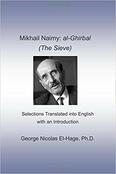Mikhail Naimy: al-Ghirbal (The Sieve):
Selections Translated into English with an Introduction
When The members of the Pen Bond Association (al-Rabita al-Qalamiya), a distinguished group of “like-minded” authors to borrow Naimy’s phrase, were busy writing and publishing in New York City and striving to modernize and change the course of Arabic Literature, there was another group in the Middle East, particularly in Egypt (The Diwan Group) trying, within the limitations imposed on them by their closed environment, to do the same but with much less success. Perhaps it is not fair to compare the achievements and impact of these two separate groups on the modernization of Arabic literature and poetry at the turn of the twentieth century and the three decades that followed because al-Akkad, al-Mazini, and to some extent Shoukry, although they were open-minded and wanted to be tolerant of new ideas and literary theories, they still lived in a very conservative and extremely traditional society that worshiped the past and adhered to ancient rules of grammar, linguistics, morphology, and prosody. In al-Akkad, Naimy found a partner, a “like-minded” counterpart across the seas, who shared with him some basic understanding of the role of literature, poetry, the poet, and the critic. These two prominent authors had more in common even if al-Akkad insisted on putting language above the poet, thus disagreeing with Naimy who believed that language is but an instrument and a means to an end. Nevertheless, it was befitting that al-Akkad was chosen to write the introduction to the first edition of Naimy’s influential book of literary criticism, al-Ghirbal, because the Egyptian Scholar was also in his own way trying to innovate in an environment shackled with a heavy inheritance of outworn traditions and forced to still wear the outmoded garments of a bygone world. As a critic, Naimy ignited a revolution that set new standards for literary criticism in modern Arabic literature. Al-Ghirbal is a decisive and definitive statement which rejects the years of stagnation that plagued Arabic literature and offers new rules and guidance to replace the archaic ones. The book bravely admits that thanks to Western literature and theories of literary criticism, we started to witness a noticeable change in Arabic literature. It introduces and legitimizes the theater, acting, the role of the actor, the play writer, and novelist as well as the important act of translating and the vital role of the translator. Placing the book in its proper historical timeframe, we realize that many of the revolutionary ideas and concepts advanced in al-Ghirbal were at the time of its publication considered avant-garde, radical, and almost heretical. The amazing fact is that the message of this book is as relevant today as it was valid and pertinent then, and if Naimy returned to life, he would not change a word in the book. Al-Ghirbal’s message was strong and clear. It was certainly meant to awaken the sleepy and “lazy” minds and souls and to shock, anger, and even hurt the sensitivity of its readers and the hosts of versifiers and pretenders who thought they were poets and drive them to rethink, reconsider, and reevaluate. All said, al-Ghirbal remains one the most powerful documents on literary criticism in modern Arabic literature since the turn of the twentieth century. It abounds with sarcasm that bites but also with wisdom that enlightens and guides. It also summarizes the position of the Pen Bond Association (al-Rabita al-Qalamiya) regarding poetry and the role of the poet and of literature as they viewed it and strongly advocated to popularize and modernize it.

